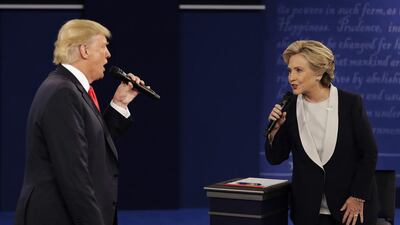ABU DHABI // The most senior elected Republican in the United States, House of Representatives speaker Paul Ryan, said on Monday he will no longer “defend” or campaign with Donald Trump and instead focus on maintaining his party’s majority in Congress.
Mr Trump’s candidacy suffered a crippling blow on Friday when a video from 2005 came to light that showed the Republican candidate speaking crudely about women and appearing to brag about sexual assault.
The revelations led to more than a dozen senior Republicans withdrawing their endorsements of Mr Trump and his own vice presidential candidate, Mike Pence, temporarily suspending campaigning.
During a conference call with other House Republicans, Mr Ryan seemed to concede the election to Mr Trump’s Democratic rival, Hillary Clinton, who is leading in national polls and in several key battleground states.
“He will spend his entire energy making sure that Hillary Clinton does not get a blank cheque with a Democrat-controlled Congress,” a person who heard the call said.
Mr Ryan also appeared to give representatives the green light to cut ties with the controversial presidential nominee.
“You all need to do what’s best for you in your district,” the speaker said.
With his campaign in crisis, Mr Trump used the second presidential debate on Sunday night to unleash vicious and even more personal attacks on Mrs Clinton in a no-holds-barred strategy unprecedented in modern American politics.
He called the Democratic candidate “the devil” and said “she has tremendous hate in her heart”. He also played a card that before last week some had thought would be too far even for him – accusing Mrs Clinton’s husband, former US president Bill Clinton, of raping and harassing women and accusing Mrs Clinton herself of smearing the alleged victims. Three of the women were even in the audience, invited by Mr Trump.
Such tactics were aimed at rallying Mr Trump’s base and perhaps scaring the Republican establishment again into submission. But the Republican candidate did virtually nothing to appeal to the undecided voters in key demographics that he must attract in order to register an increasingly unlikely win on November 8.
An NBC News/Wall Street Journal poll conducted on Saturday and Sunday before the debate showed Mrs Clinton with 46 per cent support, compared to 35 per cent for Mr Trump.
The Republican candidate began the debate tentatively but gained in confidence, repeatedly interrupting Mrs Clinton to accuse her of lying while looming behind her while she spoke and claiming that the two moderators were taking her side.
He even promised to appoint a special prosecutor to investigate Mrs Clinton’s private email use while secretary of state, adding: “You’d be in jail.”
The Democratic candidate refused to answer some of the accusations, particularly about her husband, preferring to look restrained and address members of the town hall-style audience directly. There were some points during the 90 minutes when she baited Mr Trump, however.
“OK, Donald. I know you’re into big diversion tonight – anything to avoid talking about your campaign and the way it’s exploding and the way Republicans are leaving you,” Mrs Clinton said after he sarcastically referred to 33,000 emails she allegedly deleted in violation of a congressional subpoena.
When directly questioned by the moderators about his 2005 remarks, Mr Trump repeatedly tried to change the topic to ISIL. “Yes, I am very embarrassed by it and I hate it, but it’s locker room talk and it’s one of those things. I will knock the hell out of ISIS,” he said.
His scorched-earth strategy appeared to have accomplished one goal: The consensus among US political commentators was that Mr Trump had done enough to stave off a complete meltdown of his campaign through a more assured performance than in the first debate. But he didn’t seem to have done enough to win the debate. A CNN/ORC poll found that 57 per cent of debate watchers thought Mrs Clinton won, while 34 per cent said Mr Trump had.
The two candidates spent a significant portion of the debate on relations with Russia and Middle East policy, which featured Mr Trump’s weakest moments. The businessman has publicly admired president Vladimir Putin during the campaign at a time when US-Russia relations are at a nadir.
Last week WikiLeaks published a tranche of emails purported to be from Mrs Clinton’s chief of staff that included paid speeches she has refused to make public. The leak came hours after the US intelligence community formally accused Russia of attempting to interfere in the US elections process with wide-scale hacking and cyber attacks.
While distancing himself from the leaks, Mr Trump nonetheless called for a rapprochement with Russia. This contradicted earlier statements by his running mate Mr Pence who last week described Mr Putin as a “bullying leader” who must be subjected to “American strength”.
Mike Pence “and I haven’t spoken and I disagree”, Mr Trump said, adding that the US should put aside its differences and ally with Russia in the fight against ISIL.
Mr Trump also implied that – despite the ongoing Syrian, Iranian and Russian offensive devastating eastern Aleppo – the US should work with Syrian president Bashar Al Assad and Tehran.
“I don’t like Assad at all, but Assad is killing ISIS. Russia is killing ISIS and Iran is killing ISIS,” he said.
foreign.desk@thenational.ae
* With additional reporting by Agence France-Presse

